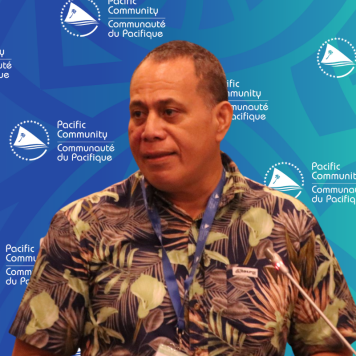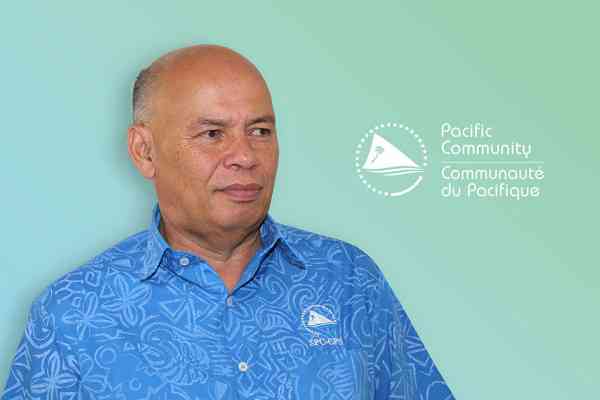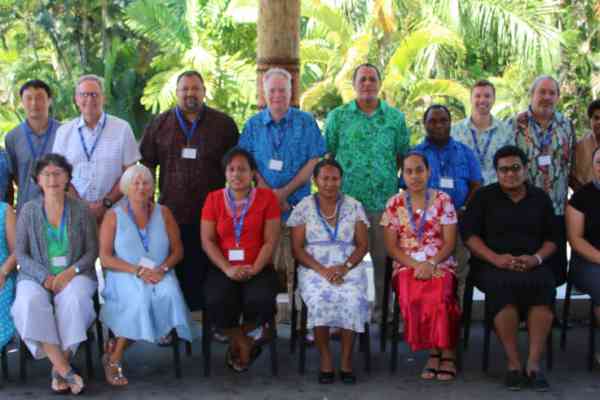Nous sommes enracinés dans nos cultures, nos traditions, notre mode de vie communautaire et notre océan. La Journée mondiale de l’océan, célébrée le 8 juin, a pour thème cette année : L’océan, vie et moyen de subsistance. Ce thème est parfaitement adapté à l’Océanie, compte tenu des liens entre les moyens d’existence des populations et l’océan Pacifique, qui est source de nourriture et de nutriments essentiels pour les générations actuelles, comme il l’a été pour nos ancêtres.
(contenu complet disponible en anglais uniquement)
My name is Dr Berlin Kafoa and in June 2021 I became the new Director for the Public Health Division at the Pacific Community (SPC). The Public Health Division (PHD) supports SPC’s members through the provision of assistance in public health surveillance, in the prevention and control of communicable and non-communicable diseases and now working on safeguarding Pacific’s population from the COVID-19 pandemic.
The global pandemic has made us realize how important it is to establish a robust health care system that advocates and creates awareness for a heathier Pacific population.
While our health care facilities in the region are still very fragile and become overburdened when an outbreak such as COVID-19 occurs, it requires - now more than ever - greater investment and support to strengthen health service delivery.
At SPC, we work in collaboration with our donors and partners to achieve both immediate and longer-term goals, from helping our members prepare and respond to COVID-19 and other outbreaks to helping them fight protracted health crises such as the non-communicable diseases (NCD) crisis.
On the COVID-19 front, SPC works with the World Health Organisation (WHO) - led Joint Pacific COVID-19 Incident Management team (JIMT) to assist PICTs with COVID-19 preparedness and response.
The Public Health Division provides Pacific Island Countries and Territories (PICTs) with technical support through clinical services, infection, prevention and control, laboratory and surveillance, risk communications, trainings and biomedical services.
I would like to acknowledge the tireless work our frontline workers are putting in for our people while putting themselves at risk. Their efforts are to be commended, and we should all support them in countries where the virus is circulating by staying home unless absolutely necessary to leave the house, practising physical distancing, wearing a mask and washing our hands with soap and water.
On the NCD front: this crisis is a major concern to the Pacific, with 75% of deaths in the region attributed to diseases such cardiovascular diseases, cancer, diabetes, and chronic respiratory diseases.
Working towards fighting these silent killers, the NCD programme has established accountability mechanisms the Monitoring Alliance for NCD Action (MANA) dashboard, Pacific legislative frameworks, national multisectoral NCD committees, NCD youth advocates and developed NCD related manuals, guidelines, and publications.
That said, we cannot separate these important efforts which are made to help our members strengthen their health systems from a more global action in favour of our environment, and in particular the ocean, of which 98% of the Pacific region is made.
During the first Pacific Health Ministers Meetings (PHMM) in 1995, the health ministers declared their vision of healthy islands as places where children are nurtured in body and mind, environments invite learning and leisure, people work and age with dignity, ecological balance is a source of pride and the ocean which sustains us is protected.
We are rooted in culture, traditions, communal living, and our ocean. June 8th celebrates World Oceans Day and this year’s theme is the ocean: Life and Livelihoods. This theme is most appropriate given how intwined Pacific people’s lives and livelihood are to the ocean. For our ancestors and our current generations, the ocean is a food source which supplies critical nutrients to the Pacific peoples.
We won’t be able to address health challenges in the Pacific if we don’t build a healthy relationship with our ocean, where the ocean nurtures people and we in return as a healthy population, sustain and protect it for our future generations.
Supporting Pacific public health, strengthening health service delivery, COVID-19 preparedness and response and achieving our environmental ambitions seems like a daunting challenge, but I am confident that with a combined effort and from all players in the development sector, we can do it.


